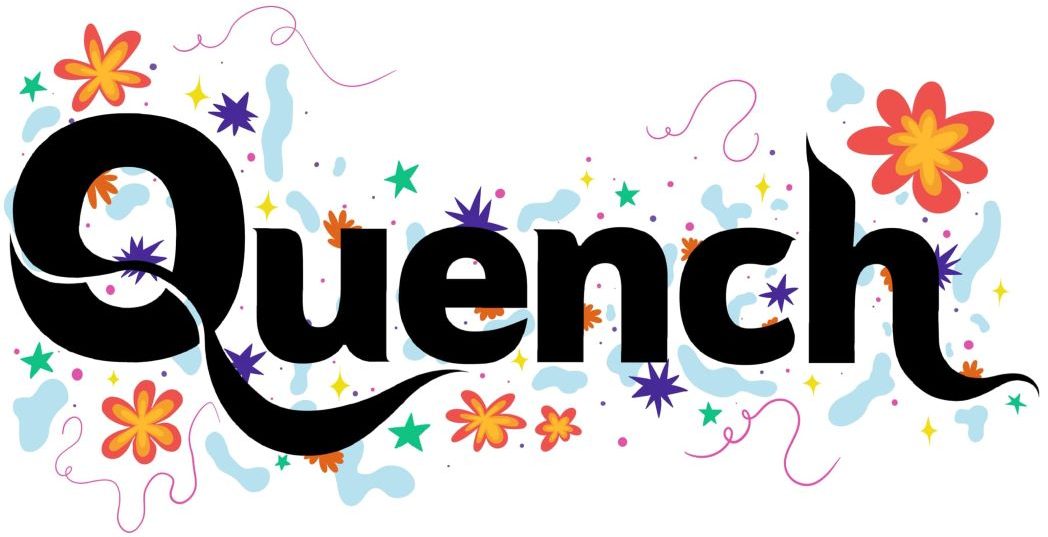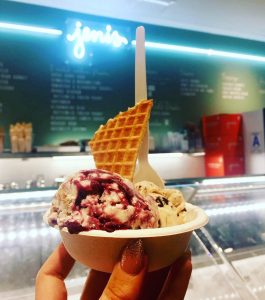By Ellie Philpotts and Georgia OÔÇÖBrien
The shorter version of this is in the current and final print issue of Quench, also at https://issuu.com/gairrhydd/docs/quench_163 (Pg 34-35)
These days, you can barely open anything ÔÇô whether the Instagram app, a celeb magazine, or even your kitchen cupboard, without embarking on a stare-off with a health product of some kind. Of course, glossy publications have never known a time where the oxymoron of ÔÇÿlove yourself for who you areÔÇÖ against reality starsÔÇÖ diet tips isnÔÇÖt splashed across the pages, and although theyÔÇÖre getting all the more prevalent, supermarket aisles being adorned with superfoods beyond the humble apple and carrot is no new concept. But as fully-fledged members of the social media generation, it can seem harder than ever to ignore health trends, exercise examples and poached-egg preachers.
 ThatÔÇÖs where Not Plant Based steps in. The brainchild of Laura Dennison and Eve Simmons, this corner of the internet (www.notplantbased.com) keeps the ÔÇÿtroubled eaterÔÇÖ firmly in mind. Laura and Eve share the belief that this group of people havenÔÇÖt been accurately represented in the intended audiences of food, fitness and health sites, so offer a refreshing outlook, blending their personal experiences with a hefty dose of truthfulness and a generous dollop of individuality, from innovative images to quirky videos. A sprinkling of seriousness but a fist-full of fun, and Not Plant Based have well and truly proven the old adage ÔÇÿtoo many cooks spoilt the brothÔÇÖ is an outdated one. Laura and Eve have since expanded to feature a range of contributors, and their rising popularity shows itÔÇÖs paying off. Here, Quench Food Editors Ellie Philpotts and Georgia OÔÇÖBrien asked away til our heartsÔÇÖ content.
ThatÔÇÖs where Not Plant Based steps in. The brainchild of Laura Dennison and Eve Simmons, this corner of the internet (www.notplantbased.com) keeps the ÔÇÿtroubled eaterÔÇÖ firmly in mind. Laura and Eve share the belief that this group of people havenÔÇÖt been accurately represented in the intended audiences of food, fitness and health sites, so offer a refreshing outlook, blending their personal experiences with a hefty dose of truthfulness and a generous dollop of individuality, from innovative images to quirky videos. A sprinkling of seriousness but a fist-full of fun, and Not Plant Based have well and truly proven the old adage ÔÇÿtoo many cooks spoilt the brothÔÇÖ is an outdated one. Laura and Eve have since expanded to feature a range of contributors, and their rising popularity shows itÔÇÖs paying off. Here, Quench Food Editors Ellie Philpotts and Georgia OÔÇÖBrien asked away til our heartsÔÇÖ content.
Q (Does this stand for ‘question’ or Quench Food, who knows) – Hi both and thank you so much for featuring in Quench Food! When did you begin to act on all the budding inspiration behind┬áNot Plant Based?
Laura – The idea for Not Plant Based was born back in the summer of last year, but we only went live in September. IÔÇÖd initially planned to go it alone as IÔÇÖd always wanted to help others with eating disorders, but after meeting with Eve and realising that we shared the same vision, drive and similar eating disorder stories, it made sense to team up. IÔÇÖm so glad I met her, and if truth be told I donÔÇÖt think I couldÔÇÖve done it on my own!
Eve – I had been out of treatment for anorexia for 9 months and have been writing about eating disorders and nutri-bollocks since I first went into treatment. I’d wanted to do something to raise awareness for a while but hadn’t quite landed on anything concrete – and then I met Laura…
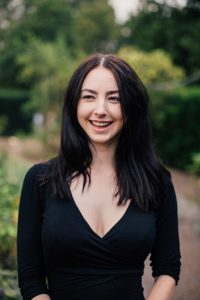 Q – WhatÔÇÖs your number one piece of advice for someone struggling with their eating habits?
Q – WhatÔÇÖs your number one piece of advice for someone struggling with their eating habits?
Laura – Disordered eating comes in many forms and there are many different issues at the route of it, so itÔÇÖs difficult to give a few rounded tips that are applicable to everyone. What I would say, is to try to unpick what it is thatÔÇÖs causing your troubled relationship with food. For me, it was anxiety, and IÔÇÖve finally been able to come up with ways to manage that. If I had had a bit more understanding and help when I was younger, my bulimia probably wouldnÔÇÖt have lasted six long years.
Another thing IÔÇÖd say would be not to persecute yourself for enjoying food. ItÔÇÖs such a shame that people, particularly women, canÔÇÖt enjoy a slice of cheesecake without a wave of immense guilt hitting them afterwards. DonÔÇÖt feel guilty, itÔÇÖs your right to enjoy food and you should consider yourself extremely lucky to be living in a time where such wonderful food is readily available.
Eve – It depends what you classify as ‘struggling’. I think if you notice that your eating habits are being triggered by your emotions in a way which is unhelpful or damaging, then try to identify the emotion and establish the root cause of that particular feeling. If you find that food and diet is taking up a disproportionate amount of head space – so much so that it’s making you miserable or interfering in everyday life – then IÔÇÖd strongly advise seeking professional help. Eating disorders are complicated and if left untreated can be much more serious than most people realise. If you think you might be struggling with an eating disorder please please please see your GP and ask for a referral to a local eating disorder clinic or specialist. It’s scary, but worth it – I promise!
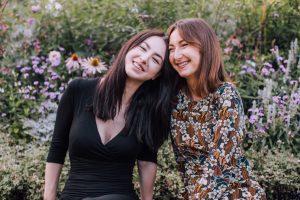 Q- Eating well at university can be difficult and often expensive. Do you have any tips for students trying to maintain a healthy lifestyle away from home?
Q- Eating well at university can be difficult and often expensive. Do you have any tips for students trying to maintain a healthy lifestyle away from home?
Eve – Erm, university is definitely not a time to prioritise being healthy so for heaven’s sake PLEASE don’t waste all that student loan on green juices. It’s for booze and beans on toast ONLY. Joking, but seriously don’t be a dick, university is three (or four) very short years and you probably won’t get another experience like it in your whole life. Do what you want, enjoy it as much as you can and if that means downing 10 vodka & oranges, a cheeky trip to the kebab shop on the way home and a duvet day with Domino’s the next day, then so be it.
Laura – ItÔÇÖs always going to be more difficult for people with less money to buy vegetables and a variety of unprocessed food, thatÔÇÖs a fact, but all you can do is your best. Live within your means and know that often the most inexpensive foods can be the most nutritious. Stock up on potatoes.
For exercise, thereÔÇÖs plenty you can get involved with sports-wise in university societies, if youÔÇÖre interested. Otherwise, go for a walk, clear your head, go out and dance all night with your friends. Try not to worry ÔÇô thatÔÇÖs a huge part of maintaining your health that is neglected a lot of the time.
Q – As a student-run magazine, weÔÇÖre always interested to learn how people like yourselves got into the industry. Which paths led you to blogging as a way of expressing how you felt about food/fitness, and how did you develop your ideas to where they are today ÔÇô was there a set point during this process which was particularly promising for you?
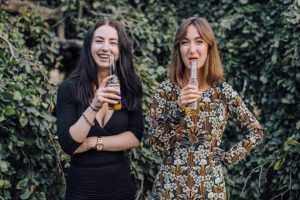 Laura – Myself and Eve are both trained writers and journalists, and have been working in the field for a few years now. It was important for us to create solid, funny, well researched content that weÔÇÖd be proud of and want to read, and thatÔÇÖs what makes us stand out. I think people are a bit bored of reading blogs by Instagram models with sub-par written content.
Laura – Myself and Eve are both trained writers and journalists, and have been working in the field for a few years now. It was important for us to create solid, funny, well researched content that weÔÇÖd be proud of and want to read, and thatÔÇÖs what makes us stand out. I think people are a bit bored of reading blogs by Instagram models with sub-par written content.
Personally, I dropped out of university because I was so unwell with my eating disorder, but I worked my little bum off doing unpaid internships and working in a pub until I had enough money to do an NCTJ Journalism short-course, which lead to my first job in a news agency. There I learned the skills I needed for Not Plant Based.
WeÔÇÖve both been fairly taken a back and humbled by the Not Plant Based journey (lol) so far, and weÔÇÖre just excited about all the opportunities coming our way. WeÔÇÖve worked really hard and weÔÇÖre so pleased everyone seems to like what weÔÇÖre doing.
Eve – I did an MA in Magazine Journalism at City University. It was a brilliant experience and fantastic training but it’s not for everyone and can be very expensive. I was extremely lucky to be able to do the course as I lived at home in London. I’d say find people’s names and email addresses (it’s not that hard, Google is a brilliant thing) and ask them to go for a coffee. You never know what they might tell you or who they could introduce you to and you’ll be surprised at how nice people are!
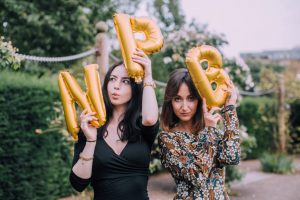 Q – Why do you think social media has such a growing influence on the way young people perceive their own bodies?
Q – Why do you think social media has such a growing influence on the way young people perceive their own bodies?
Eve – Because everyone is looking for an easy, quick-fix rule-book to making themselves look a certain way, and social media is the perfect example. It’s ingrained into us from such a young age that we MUST look a certain way to be acceptable or successful and these beliefs are so difficult to overcome. It’s so important to be curious about everything you read and all the pictures you see. They’re not representative┬áof real life! The more we question them, the less power they’ll have over the standards we inflict on ourselves.
Laura – Because itÔÇÖs not real life!!! Social media is a marketing tool and people tend to only display the very best versions of themselves. IÔÇÖm guilty of doing it too, but itÔÇÖs human nature to be competitive.
ItÔÇÖs difficult not to feel less than that when looking at beautiful, rich people on Instagram, but know that youÔÇÖre worthy and different and have something great to bring to the table – whether that translates to a pretty little square photo or not.
Q – Do you think the role of social media is only going to increase, or is it starting to┬áveer┬áin a more promising direction?
Eve – I think there does seem to be some sort of backlash – people are getting sick and tired of being made to feel inadequate. The problem is, thereÔÇÖs such a huge wealth of information out there and it’s only going to increase. Hopefully, we’ll become more cynical about the things we see and be able to view it in context rather than taking it all at face value. I have hope!
Laura – Social media has been a total game changer, but with the likes of the body positive movement, I think itÔÇÖs becoming a far more accepting place for people of all different ethnicities, body shapes and facial structures. ItÔÇÖs become okay to love yourself now, and I think thatÔÇÖs brilliant.
Q – I really like your emphasis on the personal. When you were both suffering with eating disorders, did you think there were enough resources to help you feel less alone, or did you set up Not Plant Based specifically to bring more of that community connection?
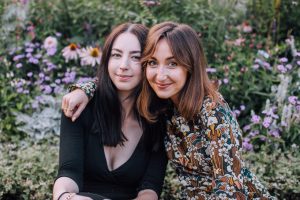 Laura – I felt totally alone during the height of my eating disorder and I think a huge part of the problem was that I was too embarrassed to seek help from anywhere/anyone. Setting up Not Plant Based has highlighted that there really isnÔÇÖt enough help out there for people with not only eating disorders, but troubled eating in the broader sense.
Laura – I felt totally alone during the height of my eating disorder and I think a huge part of the problem was that I was too embarrassed to seek help from anywhere/anyone. Setting up Not Plant Based has highlighted that there really isnÔÇÖt enough help out there for people with not only eating disorders, but troubled eating in the broader sense.
Eve – No, there are definitely too few resources for people suffering with eating disorders and the resources that do exist don’t reach enough people. I was incredibly lucky to have an informed family and a mother who worked in the health world – there was no way I would get away with not being marched off to the doctors! There was also a brilliant ED service in my local area which is very, very rare in the UK.┬áMost people aren’t so lucky…
I also think a lot of the resources out there speak to ED patients like theyÔÇÖre exactly that – patients. People often see the eating disorder before the person and focus only on their food/exercise behaviours rather than them as a whole person. It’s such a huge spectrum and I think it’s really important to talk about eating disorders openly and honestly to create an environment where people feel safe and comfortable. The more we can discuss the issues as a society and make people realise that what they’re experiencing is a perfectly “normal” part of being a human being, the more we can help earlier and more effectively.
Q – It seems like one of the reasons Not Plant Based is such a success is because of how close you are with each-other. How did you meet and form a friendship?
Laura – I love this question and IÔÇÖm glad that it shows that weÔÇÖre close. Eve and I only met last year, but sheÔÇÖs the only person IÔÇÖve been able to talk to about my eating disorder, warts and all, because I know she can relate. It would be difficult not to become close to someone after that. SheÔÇÖs been a huge part of my recovery and sheÔÇÖs just a wonderful person. We share the same work ethic and goals and itÔÇÖs such a pleasure to be able to share all the successes with her.
Eve – ^^^^^ AWWWWWWWWWWWWW.┬áIÔÇÖm always baffled by how lucky IÔÇÖve been with my recovery in comparison to others. When I met Laura, and she told me that she’d suffered for many, many years with no help and no one to speak to about it, I immediately wanted to do all┬áI could to share all that IÔÇÖd learned from the professionals and be a support to her. Little did I know that I actually ended up needing her a hell of a lot more than I realised! We’ve only known each-other for 8 months but it honestly feels like I’ve known her all my life. I can’t explain it, she just gets it! She’s been kind enough to let me share this journey (soz, I hate that word) with her and for that, IÔÇÖm eternally grateful. We also have GREAT brunch dates.
Q – Serious friendship goals! How would you sum up your main aims in just three words?
Laura – Love your food.
Eve – ^^^ Ditto.
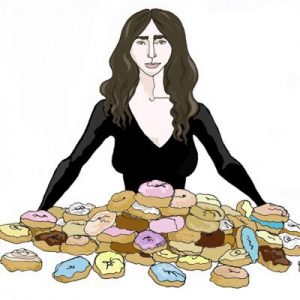 Q – I love how you offer a platform for other writers, such as the pieces ÔÇÿIÔÇÖm a man with anorexiaÔÇÖ and ÔÇÿWhat to eat according to a dietitian.ÔÇÖ Do you think providing a range of voices gives readers a better-rounded scope of all things health-related?
Q – I love how you offer a platform for other writers, such as the pieces ÔÇÿIÔÇÖm a man with anorexiaÔÇÖ and ÔÇÿWhat to eat according to a dietitian.ÔÇÖ Do you think providing a range of voices gives readers a better-rounded scope of all things health-related?
Eve – Totally. We’re very aware that it’s just the two of us and although we can give a pretty good representation of our own experiences, everything is unique to each individual person. Especially when it comes to mental health issues. Hence we’re keen to offer a wide variety of stories and experiences.
Laura – Yes. Not Plant Based is a community as much as it is our baby. ItÔÇÖs important to give a voice to people whoÔÇÖve felt so alone for such a long time. Our readers seem to love our contributory pieces.
Q – Which part of your work do you think readers respond best to ÔÇô social media, videos, written blog-posts, images?
Eve – Food myth-busting pieces are always a winner. I think it shows how much bullshit is out there – people are delighted to be offered a different perspective!
Laura – People love posts that are fact-heavy, but they also love humour. Would you believe? People with eating disorders arenÔÇÖt miserable all the time?! Our posts on Instagram that are funny or that and poking fun at clean eating always get the most likes.
Q – Well thank you so much ÔÇô weÔÇÖre definitely going away with a new approach on all things foodie and fitness.
